Reqtify
User Manual
Reqtify 2009-1
© Geensys
www.geensys.com - support@geensys.com
�
Table of contents
1 HOW TO USE THIS DOCUMENTATION .................................................................. 6
1.1
1.2
1.3
Documentation Overview ..................................................................................................... 6
Important Product Documentation ..................................................................................... 7
Getting Started ...................................................................................................................... 7
2 CAPTURE AND ANALYSIS PROCESS ...................................................................... 8
Capture and Analysis Process—Related Documentation ................................................. 8
2.1
2.2
Section
Traceability Elements ......................................................................................................... 10
10
10
10
10
10
11
11
11
11
2.2.1
2.2.2 Macro-requirement
2.2.3
Requirement
2.2.4
Entity
2.2.5
Reference
2.2.6 Attribute
2.2.7
2.2.8
2.2.9
Reference Attribute
Link
Text
2.3
Compliance with Quality Standards ................................................................................. 11
3 MAIN WINDOW ........................................................................................................... 12
3.1 Main Window Presentation ............................................................................................... 13
3.2 Menu Bar ............................................................................................................................. 14
14
14
15
16
17
3.2.1
File Menu
3.2.2
Edit Menu
3.2.3 View Menu
3.2.4
Tools Menu
3.2.5
Reports Menu
3.3
3.4
3.5
Tool Bar ............................................................................................................................... 17
Status Bar ............................................................................................................................ 19
Project Workspace .............................................................................................................. 19
3.6 Management View .............................................................................................................. 19
19
21
3.6.1 Description
3.6.2
Context Menu
3.7
Coverage Analysis View ..................................................................................................... 22
22
23
3.7.1 Description
3.7.2
Context Menu
3.8
Impact Analysis View ......................................................................................................... 25
25
3.8.1 Description
�
3.8.2
Context Menu
26
3.9
Context Menu
Graphical View.................................................................................................................... 27
27
30
3.9.1 Description
3.9.2
3.10 Requirement Details View .................................................................................................. 32
32
33
3.10.1 Description
3.10.2 Context Menus
4 CONFIGURATION DIALOG BOX ............................................................................ 34
4.1
4.2
Overview .............................................................................................................................. 34
Restricted Access to the Configuration Dialog Box ......................................................... 35
4.3 Management of Concurrent Access ................................................................................... 36
36
37
4.3.1
4.3.2 User Changes Management
Control Access on Reqtify Activities
5
PROJECT CONFIGURATION ................................................................................... 38
5.1
5.2
Objectives............................................................................................................................. 38
Description ........................................................................................................................... 39
40
41
41
5.2.1 Document Details Area
5.2.2
Creating Tools
5.2.3 Undo and Redo
5.3
5.4
5.5
5.6
5.7
Adding a Document ............................................................................................................ 41
Adding Coverage Links between Documents ................................................................... 42
Adding a Folder................................................................................................................... 43
Folders and Coverage Links .............................................................................................. 44
Document Covered by Combination of several Others ................................................... 46
5.8 Modification Documents .................................................................................................... 47
5.9
Importing an Existing Project ........................................................................................... 49
6
PROJECT OPTIONS .................................................................................................... 50
6.1
Overview of the Options Dialog Box ................................................................................. 50
51
6.1.1 Overview of the Options panes
7 MANAGING THE ANALYSIS RESULTS ................................................................. 54
7.1
7.2
Rules Checking .................................................................................................................... 55
Using Views.......................................................................................................................... 55
55
55
57
59
7.2.1 Using the Management View
7.2.2 Using the Coverage Analysis View
7.2.3 Using the Impact Analysis View
7.2.4 Using the Graphical View
7.3
7.4
Displaying Requirement and Reference Types ................................................................ 59
Filters Usage and Advanced Analysis ............................................................................... 59
�
7.4.1 Display Reducing Filters
7.4.2 Defining Filters
7.4.3 Applying Filters to Project Analysis Results
7.4.4
Impact of Filters Definition
60
61
63
64
7.5
Understanding the Coverage Ratios .................................................................................. 64
64
64
64
65
Coverage Ratio for Combined Coverage
Coverage Ratio in the Management View
Impact of Filters on Coverage Ratios
7.5.1 General Case
7.5.2
7.5.3
7.5.4
7.6
Using Folders ....................................................................................................................... 67
67
68
69
70
Coverage Link between a Low Level Folder and a High Level Folder
Coverage Links between Documents in a Folder
Coverage Links between a Lower Level Folder and a High Level Document
Coverage Links between Lower Level Documents and a High Level Folder
7.6.1
7.6.2
7.6.3
7.6.4
7.7
Using Macro-requirement .................................................................................................. 71
71
72
Propagation of Elements Attached to the Macro-requirement
Coverage of Requirements Contained in a Macro-requirement
7.7.1
7.7.2
7.8
Using Requirements Hierarchy ......................................................................................... 74
8 USING REQTIFY TO CREATE INFORMATION ................................................... 76
8.1
Adding Traceability Information in your Project Documents ....................................... 76
76
Features for Insertion of Coverage Information in Project Files
8.1.1
8.2
Adding Information from Reqtify—Basic Capabilities ................................................... 77
78
79
80
81
82
84
84
85
8.2.1 Adding Covering Links
8.2.2 Adding Attributes
8.2.3 Modification of the Added Attributes
8.2.4 Deleting Added Attributes
8.2.5 Adding Reference Attributes
8.2.6 Deleting Added Reference Attributes
8.2.7 Adding Text
8.2.8
Consistency Checking for Added Information
8.3
Adding Information from Reqtify—Advanced Capabilities ........................................... 85
86
86
8.3.1
8.3.2 Add Information to the Project Analysis Results
Include Types for Added Elements in your Project Configuration
8.4 Marks ................................................................................................................................... 89
89
91
92
93
8.4.1 Automatic and Persistent Highlight of Modifications
8.4.2 Automatic Highlight of Search Results
8.4.3
8.4.4 Using Marks in Filters
Creating your own Marks
9 DETECTION OF REQUIREMENT CHANGES ....................................................... 95
9.1
9.2
9.3
Automatic Detection Modified Elements .......................................................................... 95
Using Marks ........................................................................................................................ 96
Using Snapshots .................................................................................................................. 96
99
99
9.3.1
9.3.2 Using Snapshots to compare Results
Creating a Snapshot
�
9.3.3
9.3.4 Opening a Snapshot
Element History
100
101
10 RULES CHECK AND ERROR MESSAGES ........................................................... 102
10.1 Critical Error Messages ................................................................................................... 102
10.2 Error Messages.................................................................................................................. 102
10.3 Warning Messages ............................................................................................................ 105
11 GENERATING REPORTS ......................................................................................... 107
11.1 Generating the Traceability Matrix Report ................................................................... 107
11.2 Generating the Analysis Results Report ......................................................................... 109
11.3 Generating the Project Description Report .................................................................... 110
11.4 Generating the Upstream Impact Analysis Report........................................................ 111
11.5 Generating the Downstream Impact Analysis Report ................................................... 112
11.6 Generating the Synthesis of Added Information Report............................................... 114
11.7 Generating the Rules Checking Report .......................................................................... 114
11.8 Customizing your Report Style ........................................................................................ 115
116
118
11.8.1 Word document generation
11.8.2 Excel generation
12 OVERVIEW OF THE PRODUCT WORK FILES .................................................. 120
12.1 Main Configuration Files in the Installation Directory ................................................. 120
120
121
121
12.1.1 Types Definition
12.1.2 Report Templates
12.1.3 Templates for Report Styles
12.2 Adding Configuration Files in the Project Directory .................................................... 122
122
122
123
12.2.1 Types Definition
12.2.2 Report Templates
12.2.3 Templates for Report Styles
12.3
Information File
Project Files ....................................................................................................................... 123
123
123
124
124
12.3.1 Project Configuration File
12.3.2 Analysis Results File
12.3.3
12.3.4 Filter Definition File
12.4 Environment Variables Declaration ................................................................................ 124
124
125
12.4.1 TMP Environment Variable
12.4.2 Debugging Directory
13
INDEX ........................................................................................................................... 126
14 LIST OF FIGURES ..................................................................................................... 129
�
1 HOW TO USE THIS DOCUMENTATION
This chapter introduces the organization of the documentation.
You can read about these topics in:
Documentation Overview
Important Product Documentation
Getting Started
1.1 Documentation Overview
The Reqtify documentation is organized as shown in the following figure:
Figure 1.1: Documentation Overview
There is one Coupling Note per tool interfaced with Reqtify. These notes describe how Reqtify brings to the
engine the information to be analyzed, using either the third party tool API, or dedicated converter, or any
other convenient solution. This part is dedicated to administrators or users in charge of Reqtify customization,
in relation with the Customization Guide. The Coupling Notes also explain to users how Reqtify interacts
with their authoring and verification tool.
Reqtify - User Manual- Page 6
�
The Customization Guide explains how you indicate to Reqtify the relevant information that should be picked
up in the intermediate files. Such information can include: what are the requirements, attributes, coverage
links, and so on. In other words, the Customization Guide explains how to implement your requirement
standards in Reqtify.
The User Manual explains how to use Reqtify on your projects, such as how to describe your project's
process, how to understand the analysis results, how to filter them, how to generate reports. Aspects directly
linked to the use of authoring and verification tools are detailed in the Coupling Note for the concerned tool.
1.2
Important Product Documentation
Users need to read the User Manual and the Users part of the Coupling Notes for the tools they use (for
example Coupling Word, Coupling DOORS, etc.).
Administrators or Users who need to implement their requirements standards and to customize Reqtify need
to:
Read the Coupling Notes for the tool used in the project or process. This will enable you to
understand how the source information is converted and analyzed by the engine.
Read the Customization Guide and play the Tutorial (direct links included in the Customization
Guide, step by step).
Read the User Manual for more information about requirements management aspects and displays of
analysis results by Reqtify. This will enable you to understand users concerns and to properly support
them.
1.3 Getting Started
The best way to familiarize yourself with Reqtify is to complete the following tasks:
Read the Getting Started guide to familiarize yourself with the main windows, concepts and features.
Read and complete the tutorial example in that Getting Started.
Review the other sections in the User Manual, and familiarize yourself with all the windows, features
and analysis results calculation.
Reqtify - User Manual- Page 7
�
2 CAPTURE AND ANALYSIS PROCESS
This chapter explains how the source information is captured and analyzed.
You can read about these topics in:
Capture and Analysis Process—Related Documentation
Traceability Elements
Compliance with Quality Standards
2.1 Capture and Analysis Process—Related Documentation
In order for proper customization to take place, there needs to be a clear understanding of the analysis
process.
As depicted below, several steps have to be considered:
The source information is brought to the engine by converters. These converters transform the
information natively stored in the interfaced tool to an intermediate file containing the information in
a format that the engine can analyze.
The engine uses the definition of your requirements standards (what is the expected format for
requirements, attributes, etc.) to identify elements compliant with this definition in the intermediate
file.
The engine also uses the project definition, indicating how the intermediate files are supposed to be
linked together. This allows the engine to calculate coverage ratios, check consistency rules, etc. The
information is stored as “analysis results”.
The results can be filtered to allow more oriented analysis.
The results are displayed, produced in reports, or can be exported in tools to automate parts of the
requirements management process.
Reqtify - User Manual- Page 8
�
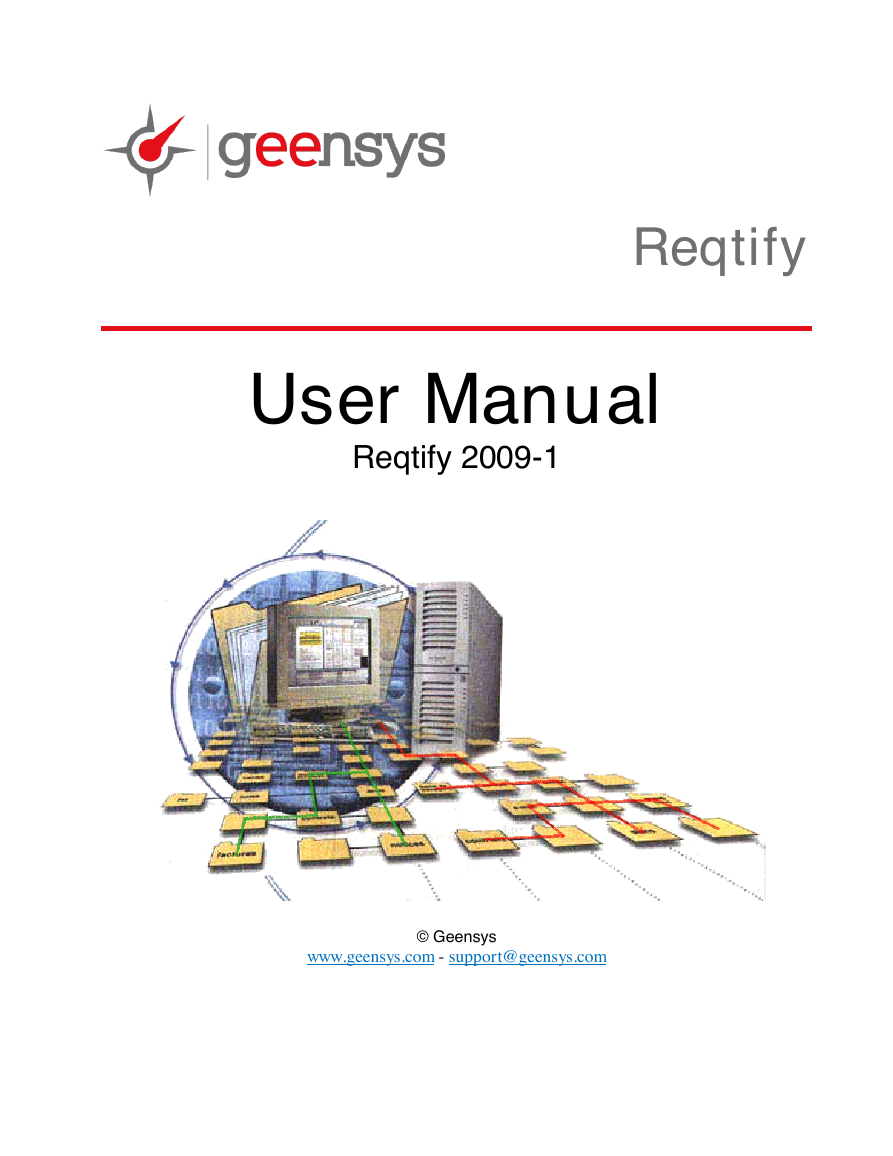

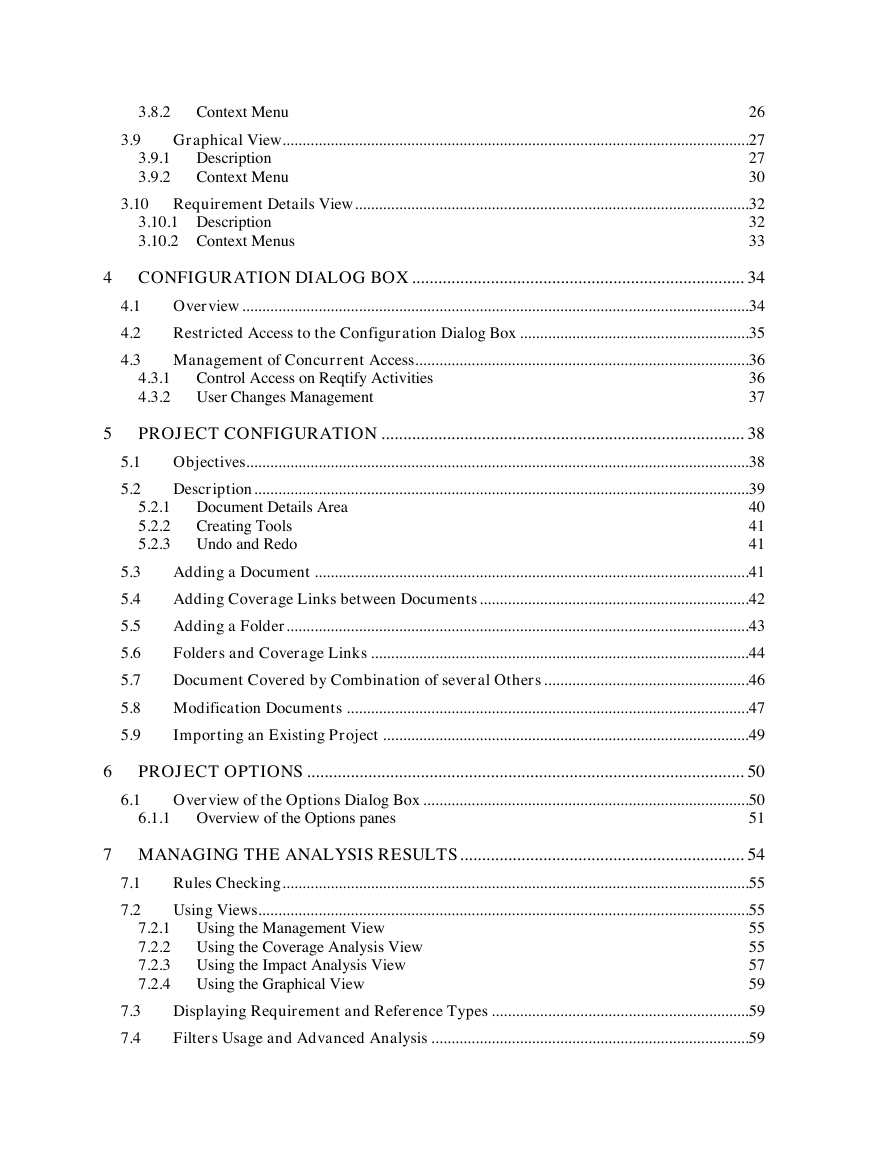
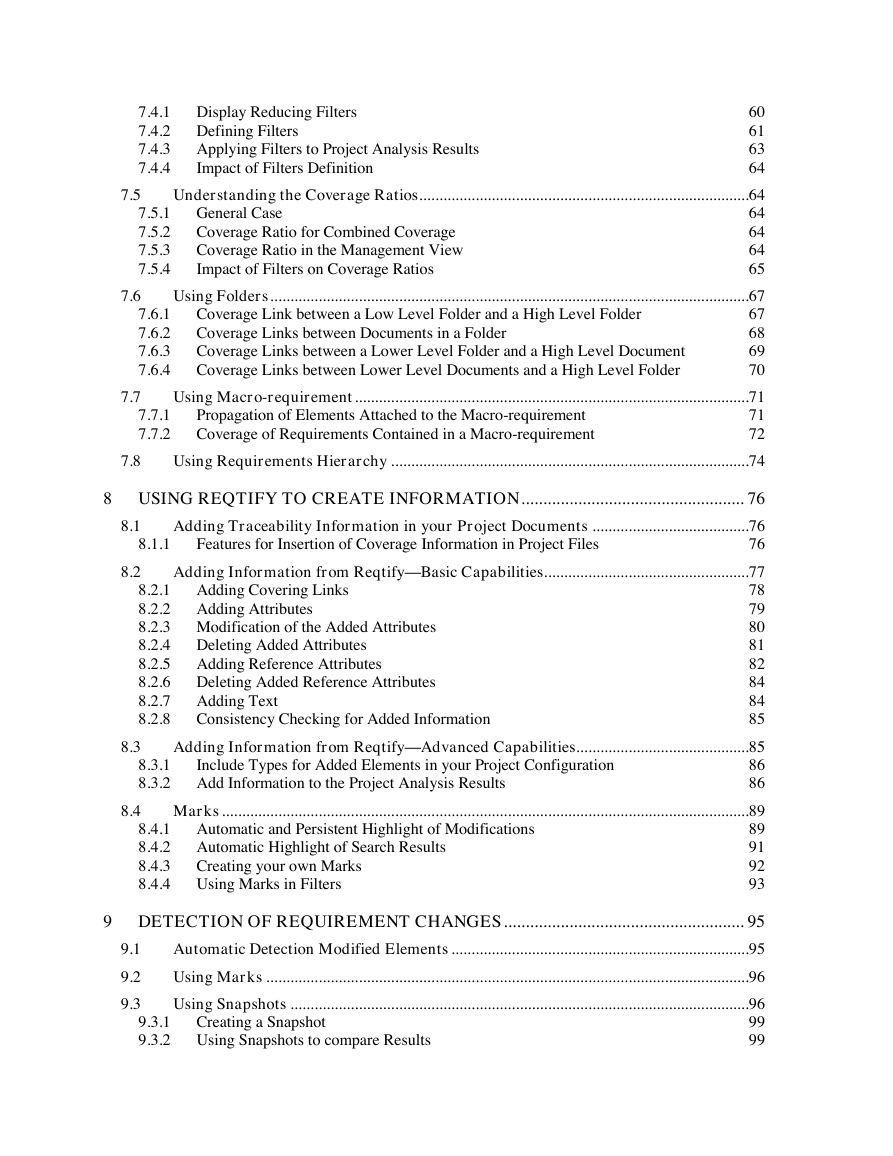

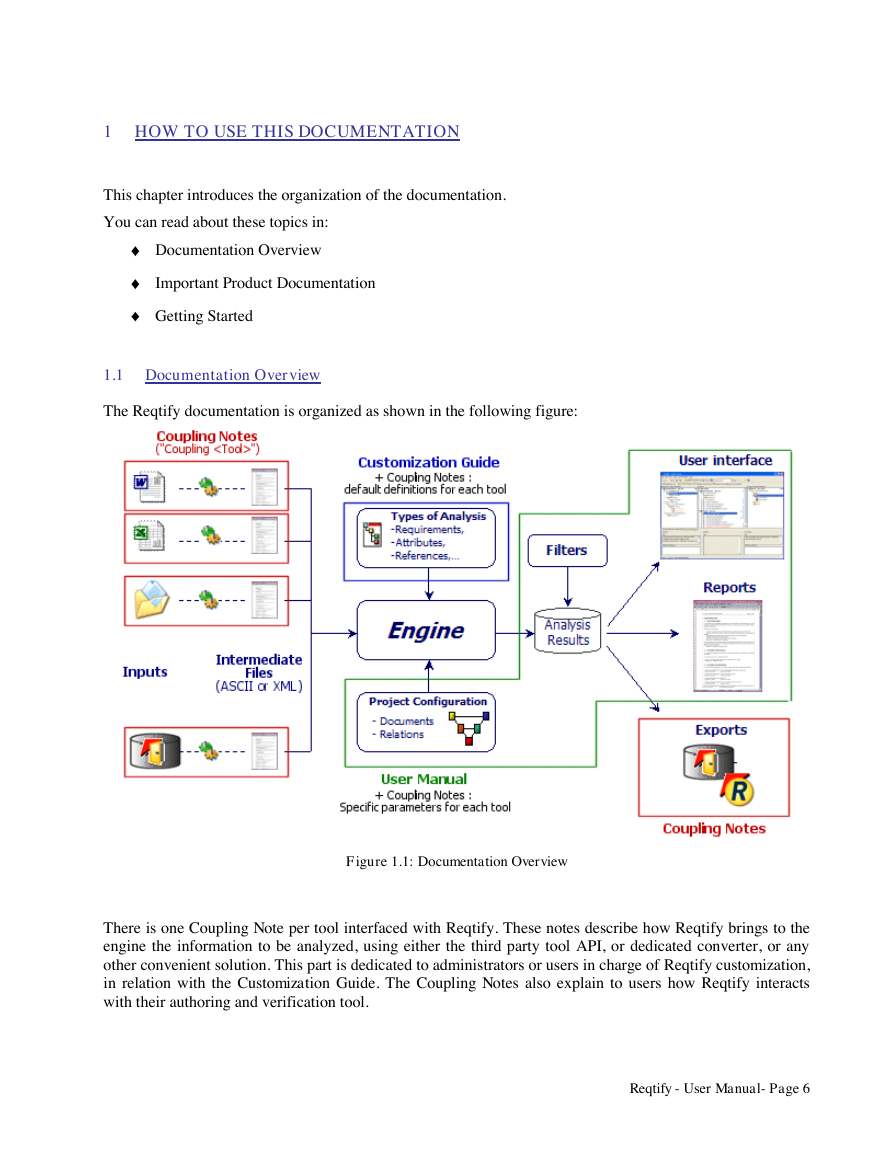
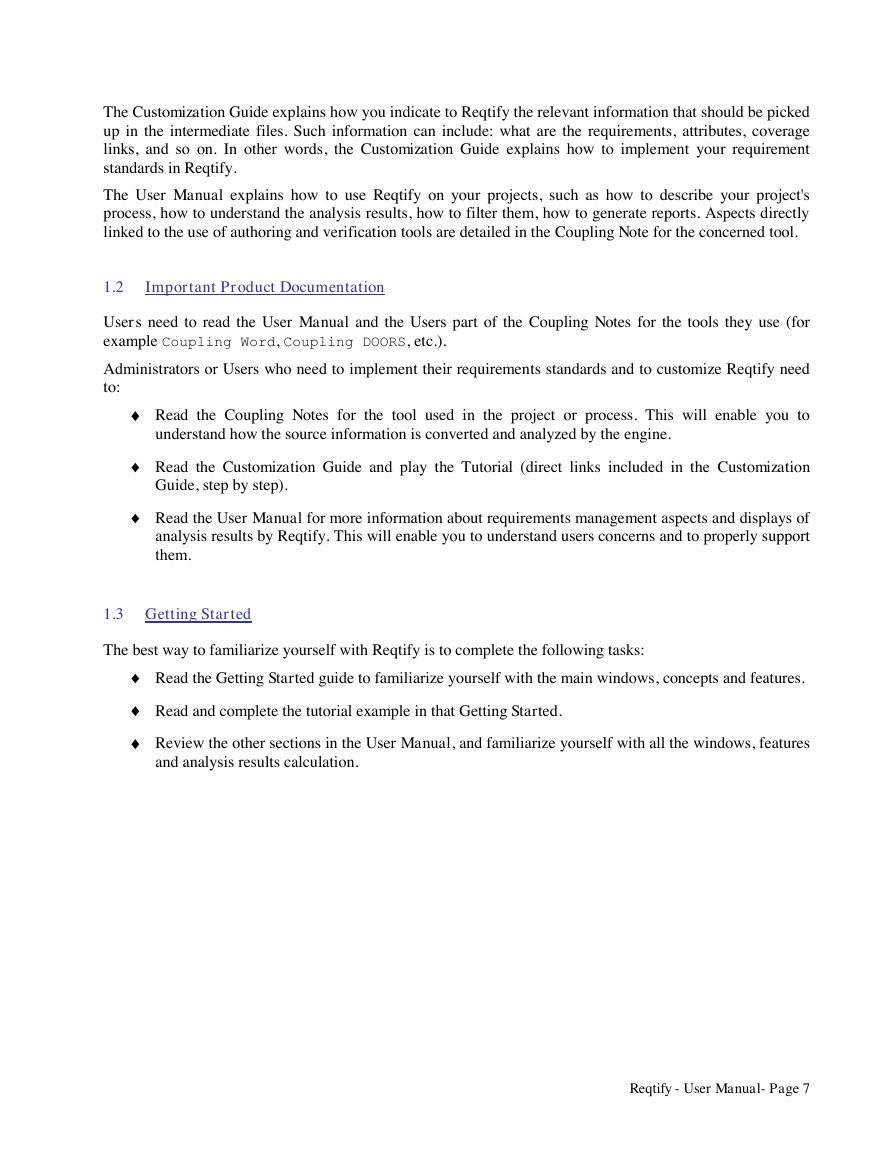
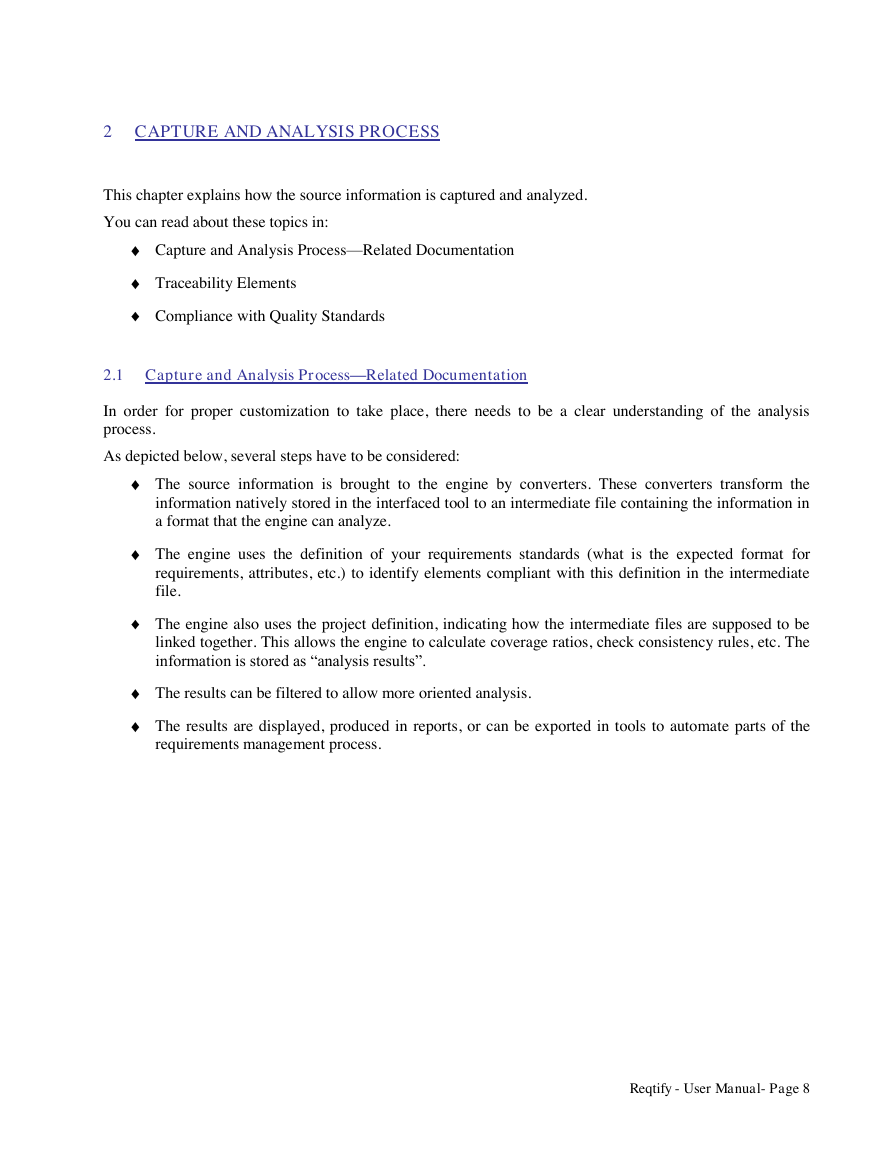








 2023年江西萍乡中考道德与法治真题及答案.doc
2023年江西萍乡中考道德与法治真题及答案.doc 2012年重庆南川中考生物真题及答案.doc
2012年重庆南川中考生物真题及答案.doc 2013年江西师范大学地理学综合及文艺理论基础考研真题.doc
2013年江西师范大学地理学综合及文艺理论基础考研真题.doc 2020年四川甘孜小升初语文真题及答案I卷.doc
2020年四川甘孜小升初语文真题及答案I卷.doc 2020年注册岩土工程师专业基础考试真题及答案.doc
2020年注册岩土工程师专业基础考试真题及答案.doc 2023-2024学年福建省厦门市九年级上学期数学月考试题及答案.doc
2023-2024学年福建省厦门市九年级上学期数学月考试题及答案.doc 2021-2022学年辽宁省沈阳市大东区九年级上学期语文期末试题及答案.doc
2021-2022学年辽宁省沈阳市大东区九年级上学期语文期末试题及答案.doc 2022-2023学年北京东城区初三第一学期物理期末试卷及答案.doc
2022-2023学年北京东城区初三第一学期物理期末试卷及答案.doc 2018上半年江西教师资格初中地理学科知识与教学能力真题及答案.doc
2018上半年江西教师资格初中地理学科知识与教学能力真题及答案.doc 2012年河北国家公务员申论考试真题及答案-省级.doc
2012年河北国家公务员申论考试真题及答案-省级.doc 2020-2021学年江苏省扬州市江都区邵樊片九年级上学期数学第一次质量检测试题及答案.doc
2020-2021学年江苏省扬州市江都区邵樊片九年级上学期数学第一次质量检测试题及答案.doc 2022下半年黑龙江教师资格证中学综合素质真题及答案.doc
2022下半年黑龙江教师资格证中学综合素质真题及答案.doc